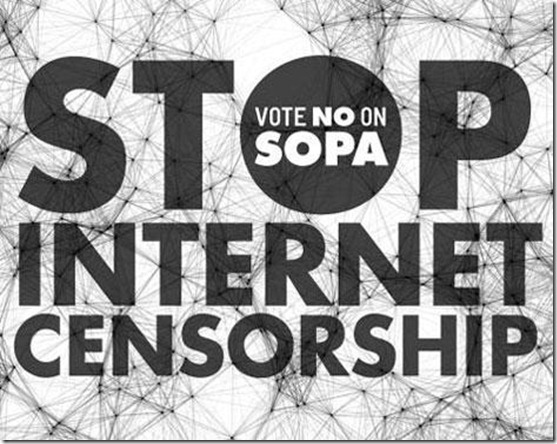Sort of like this. From A Christmas Story
SOPA, or the Stop Online Piracy Act, means well in its attempt to halt the illegal downloading of copyrighted materials on the internet. But, then again, the road to hell is paved in good intentions.
Now, before I start, keep in mind that SOPA belongs to the House of Representatives, and PIPA belongs to the Senate. PIPA is the bill that will be reviewed on Jan. 23 when the Senate reconvenes.
A description of SOPA's intent from The Wall Street Journal:
A description of SOPA's intent from The Wall Street Journal:
The Justice Department could seek a court order requiring U.S. Internet providers to block access to foreign pirate websites. Access could be blocked either by making it impossible for users to type a simple web address into an Internet browser to reach the site or by requiring search engines like Google to disable links to the sites.
The attorney general could also seek a court order requiring credit-card processors to stop processing payments to the sites and requiring advertising networks to stop placing ads on the sites or taking ads from the pirated websites for display elsewhere.
In addition, both bills would allow Hollywood studios and other content owners to take private legal action against websites that are alleged to be hosting pirated material.
The legislation would allow content owners to ask a court to require credit-card companies and advertising networks to stop payments to sites allegedly hosting pirated material.
Opponents of the legislation worry that the language in the House bill is so broad that it would allow content owners to target U.S. websites that aren't knowingly hosting pirated content. This has been a particular concern of bill opponents Facebook, Wikipedia and Twitter, all of which have sites that depend heavily on content uploaded by users.
In an extreme case, opponents say, media companies could get a court order blocking payments to an innocent site, with the effect of shutting it down and stripping it of its rights to free speech.
Also, they say the legislation would encourage authoritarian countries that have already been trying to block content on the Internet they don't like.
Sponsored by Rep. Lamar Smith of Texas, SOPA and its sister-bill , Protect Intellectual Property Act (PIPA), are poorly planned bills at best.
Sen. Marco Rubio (R-Fla.), who withdrew his support this morning, even admitted that PIPA was passed unanimously in the Senate Judiciary Committee without much consideration of its potential consequences. SOPA is still awaiting review by the House Judiciary Committee.
The people of the United States--and all over the world, really--deserve access to the information that the internet provides, free of government intervention. And it would seem that many websites, whether they receive a few million hits a day or a few hundred, are in opposition of the bills.
Big name websites including Wikipedia, reddit and WordPress have taken a stand against the bills, SOPA in particular, by either completely shutting down or blacking out sections of their websites. Wikipedia provides contact information for local government representatives, and reddit and WordPress both include petition forms to give users a voice.
"Imagine a world without free knowledge," reads Wikipedia's main page. "SOPA and PIPA damage reddit," reads reddit's, listed among a number of other websites that will feel the heat of the bills if they are passed.
WordPress.com emphasizes the reality of censorship on its homepage. Courtesy of WordPress.
Thanks to the innovation of mass communication, even search-engine behemoth Google has provided a petition form for its users. "End Piracy, Not Liberty" headlines the page, which can be found here.
It's hard to argue against the criminality of internet piracy, but it's even harder to argue against the right of the people to internet freedom.



Very well done, short, easy to understand article.
ReplyDeleteThe internet is a strange frontier for legisltation. it is kind of like a bulletin board, people can put up whatever, things can be taken down, put back up again... poor bills could really affect the liberty of the Internet